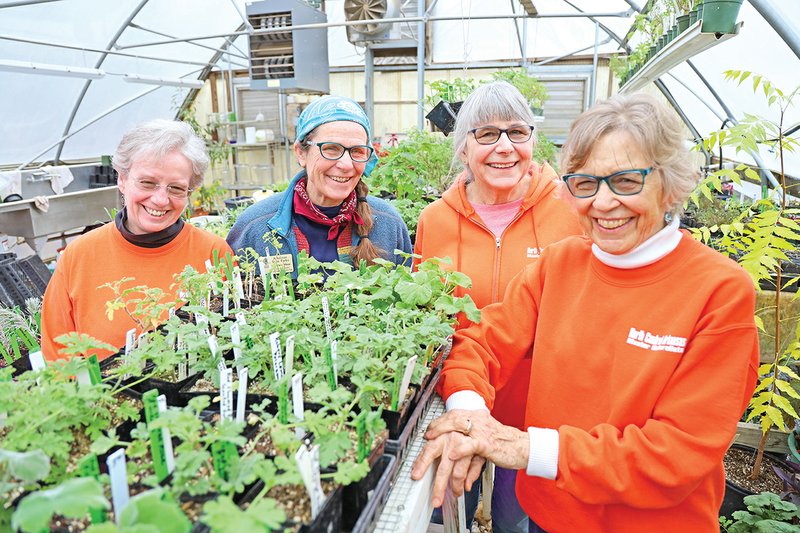MOUNTAIN VIEW — Nell Doyle of Lone Rock, a member of the North Central Arkansas Master Naturalists, has heard the question before: What’s the difference between a naturalist and a gardener?
“Sometimes I tell people that Master Naturalists are like gardeners, but we’re out in the woods,” she said. “But that’s oversimplified, and that’s not completely accurate. We are more about working in the woods and with plants that we see in the woods.”
Truth be told, both designations demonstrate a love for growing things and promoting conservation, but with a few important differences, said Liz Harris of Mountain View, a fellow Master Naturalists member.
“Master Gardeners, of which I’m not one, concentrate on gardening, and we do gardening. But we also cover a vast array of things,” she said. “In order to get certified, we have 40 hours of training in different areas, and we learn about things like trees, birds, mammals, the geology of Arkansas. We work on trails; we work to keep streams clean.”
To the many definitions and duties of the North Central Arkansas Master Naturalists, there can now be added another description: award-winning. The Ozark Folk Center in Mountain View recently recognized the organization for its work there on the grounds and in the greenhouse. Based in Bull Shoals, the North Central Arkansas Master Naturalists chapter covers Baxter, Boone, Fulton, Izard, Marion and Stone counties in Arkansas.
“First of all, I want to say that when I grow up, I want to be a Master Naturalist,” said Tina Marie Wilcox of Oxley, head gardener and herbalist for the Ozark Folk Center, joking. “I’m the full-time gardener herbalist here, and I have three part-time people who help and assist that are paid folks who come and do things with me.
“What happens with my Master Naturalist volunteers is that [the garden] reaches its potential of beauty and cultivation. It takes many hands to make a beautiful garden out of the kind of garden we have.”
Working three mornings a month, the Master Naturalists help keep the greenhouse and grounds — about 5 acres — humming, Wilcox said. Given that much ground, there’s a wide variety of tasks to be done each workday, she said.
“This is quite an extensive space,” she said. “We started out at the Skillet Restaurant in the kitchen garden and the gardens around the buildings and headed out into the craft village, where just about everything that’s not paved or built over is herb garden, because when you talk about herbs, you’re talking about beneficial plants.
“We have native areas and naturalized areas, which really require a whole lot of weeding, and a big water feature and historic kinds of themed gardens, such as a dye-plant garden and medicinal plants and our scented-geranium collection.”
The variety is one of the appealing things for the volunteers, said Harris, who is secretary of the group’s board of directors. Even though the workdays are planned, there’s really no telling what group members will be doing until they get there, she said.
“With gardening, you never know what’s going to come up the day we’re there,” Harris said. “I email the team to tell me who’s coming. A couple days before, when I know how many there are, I get in touch with Tina and her staff, and they give us an outline of what we might be doing.
“This time of year, it’s very often in the greenhouse, but there’s still gardening to be done in the wintertime. Yesterday, we were transplanting some thyme plants out of the kitchen garden out here to a new bed that had been created and also sending some over to the greenhouse to be potted.”
Besides being out in the fresh air and seeing things grow, Master Naturalist members also said the educational value is among the most gratifying elements of their work. Team members not only learn new things themselves, but they get the chance to pass that knowledge on to others.
“We have about 160 members now with our new class, which is starting in a couple weeks,” Doyle said. “In addition to trail patrol, the stream team, the folk center team and the wildflower meadow team, we also have a kids team. They go to civic celebrations like Celebrate Lakeview or Gassville in the Park, and they have little hands-on activities specifically for kids, like putting a nature journal together and making it out of an old paper grocery bag. Then in the summer, they do programs in the library in Mountain Home and come up with amazing things. And the kids just really open up and love it a lot.
“We have a lot of retired teachers in our group, which is just a wonderful thing because they can do anything, and they can organize anything. Occasionally, some of our members who are really experts at birding or trees or something will make a presentation to a civic group or another organization. One of our members just did a presentation for our continuing education on waterfowl, and he’s going to do the same thing for the Audubon Society of North Central Arkansas this week. So we do a lot of outreach.”
Doyle, who accepted the award from the Ozark Folk Center on behalf of the group, said it was gratifying to be acknowledged in such a public way for their efforts, but she also said the Master Naturalists get other compliments from park visitors and workers that are just as fortifying.
“One of the great things about working here is that we’re usually here on Wednesdays when the crafters meeting is,” she said. “We start at 9 a.m., and the craft village doesn’t open until 10. So they’ll be going past us, and everybody who works here thanks us for what we’re doing. It’s really very gratifying.”
To learn more about becoming a Master Naturalist or to get contact information for a specific chapter, visit arkansasmasternaturalists.org.
